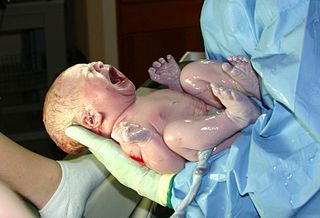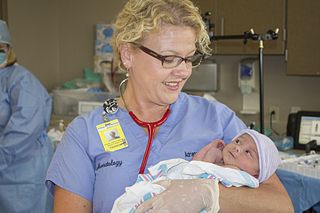
Pediatrics is the branch of medicine that involves the medical care of infants, children, and adolescents. The American Academy of Pediatrics recommends people be under pediatric care up to the age of 21. A medical doctor who specializes in this area is known as a pediatrician, or paediatrician. The word pediatrics and its cognates mean "healer of children"; they derive from two Greek words: παῖς and ἰατρός. Pediatricians work both in hospitals, particularly those working in its subspecialties such as neonatology, and as primary care physicians.

Vernix caseosa, also known as vernix, is the waxy or cheese-like white substance found coating the skin of newborn human babies. It is produced by dedicated cells and is thought to have some protective roles during fetal development and for a few hours after birth.
Transient tachypnea of the newborn is a respiratory problem that can be seen in the newborn shortly after delivery. It is caused by retained fetal lung fluid due to impaired clearance mechanisms. it is the most common cause of respiratory distress in term neonates.It consists of a period of rapid breathing. Usually, this condition resolves over 24-72 hours. Treatment is supportive and may include supplemental oxygen and antibiotics. The chest x-ray shows hyperinflation of the lungs including prominent pulmonary vascular markings, flattening of the diaphragm, and fluid in the horizontal fissure of the right lung.

Neonatology is a subspecialty of pediatrics that consists of the medical care of newborn infants, especially the ill or premature newborn. It is a hospital-based specialty, and is usually practiced in neonatal intensive care units (NICUs). The principal patients of neonatologists are newborn infants who are ill or require special medical care due to prematurity, low birth weight, intrauterine growth restriction, congenital malformations, sepsis, pulmonary hypoplasia or birth asphyxia.

A neonatal intensive care unit (NICU), also known as an intensive care nursery (ICN), is an intensive care unit specializing in the care of ill or premature newborn infants. Neonatal refers to the first 28 days of life. Neonatal care, as known as specialized nurseries or intensive care, has been around since the 1960s.
Pediatric nursing is the medical care of neonates and children up to adolescence, usually in an in-patient hospital or day-clinic. Pediatrics comes from the Greek words 'paedia' which means child, 'iatrike' which means physician. 'Paediatrics' is the British/Australian spelling and 'pediatrics' is the United States spelling.
Rainbow Babies & Children's Hospital is a children's hospital in Cleveland, Ohio. It is a part of University Hospitals Case Medical Center, formerly University Hospitals of Cleveland. In 2015-16, Rainbow ranked third in the country for neonatal care in the U.S. News & World Report rankings of pediatric hospitals.
A pediatric intensive care unit, usually abbreviated to PICU, is an area within a hospital specializing in the care of critically ill infants, children, and teenagers. A PICU is typically directed by one or more pediatric intensivists or PICU consultants and staffed by doctors, nurses, and respiratory therapists who are specially trained and experienced in pediatric intensive care. The unit may also have nurse practitioners, physician assistants, physiotherapists, social workers, child life specialists, and clerks on staff, although this varies widely depending on geographic location. The ratio of professionals to patients is generally higher than in other areas of the hospital, reflecting the acuity of PICU patients and the risk of life-threatening complications. Complex technology and equipment is often in use, particularly mechanical ventilators and patient monitoring systems. Consequently, PICUs have a larger operating budget than many other departments within the hospital.

Mildred T. Stahlman is a professor of pediatrics and pathology at Vanderbilt University in Nashville, Tennessee.

The Monroe Carell Jr. Children's Hospital at Vanderbilt, also known as Vanderbilt Children's Hospital (VCH), is a non-profit children's hospital affiliated with Vanderbilt University Medical Center in Nashville, Tennessee. The hospital was ranked among the best children's hospitals in the nation by U.S. News & World Report.
Karthik Nagesh is a neonatologist in India. He has been practicing neonatal intensive care since 1992 at the Manipal Hospital in Bangalore. He is currently the Chairman of the Manipal Advanced Children's Center and Chairman of Neonatology and Neonatal ICUs at the Manipal Hospitals Group as well as an Adjunct professor of paediatrics, KMC at Manipal University.
Dr. Joan Hodgman was a pioneer of neonatology. Her leadership and influence helped develop neonatology as a speciality. She practiced at LAC+USC Medical Center for more than 60 years, holding various positions, including Director of the Divisions of Neonatology. She worked to develop the intensive care unit with guidelines on neonatal care. She later received the AAP Virginia Apgar Award in 1999, the highest award offered in neonatology. She is well known by all practicing neonatologists; Dr. Opas, chief of pediatrics at USC referred to her as one of neonatology's "great sages."
Bubble CPAP is a non-invasive ventilation strategy for newborns with infant respiratory distress syndrome (IRDS). It is one of the methods by which continuous positive airway pressure (CPAP) is delivered to a spontaneously breathing newborn to maintain lung volumes during expiration. With this method, blended and humidified oxygen is delivered via short binasal prongs or a nasal mask and pressure in the circuit is maintained by immersing the distal end of the expiratory tubing in water. The depth to which the tubing is immersed underwater determines the pressure generated in the airways of the infant. As the gas flows through the system, it “bubbles” out and prevents buildup of excess pressures.

A neonatal nurse practitioner (NNP) is an advanced practice registered nurse (APRN) with at least 2 years experience as a beside registered nurse in a level III NICU, who is prepared to practice across the continuum, providing primary, acute, chronic, and critical care to neonates, infants, and toddlers through age 2. Primarily working in neonatal intensive care unit (NICU) settings, NNPs select and perform clinically indicated advanced diagnostic and therapeutic invasive procedures. In the United States, a board certified neonatal nurse practitioner (NNP-BC) is an APRN who has acquired Graduate education at the master’s or doctoral level and has a board certification in neonatology. The National Association of Neonatal Nurse Practitioners (NANNP) is the national association that represents neonatal nurse practitioners in the United States. Certification is governed by the National Certification Corporation for Obstetrics, Gynecologic and Neonatal Nursing Specialties (NCC).
MEDNAX, Inc. is an American company founded in 1979 and is headquartered in Sunrise, Florida. The company focuses on neonatal, anesthesia, maternal-fetal and pediatric physician subspecialty services in all 50 states and Puerto Rico. There are two subsidiaries in the company, Pediatrix Medical Group and American Anesthesiology. Pediatrix was established in 1979, and is the United States' largest provider of newborn hearing screening.
Neelam Kler is an Indian neonatologist, known for her pioneering work on neonatal intensive care and ventilation. She is credited with developing neonatal care to better the survival rate of extremely tiny preterm babies to 90 per cent. The Government of India honoured her with the third-highest civilian award, Padmabhushan, in 2014, for her services to the fields of medicine and neonatology.
Joseph J. Volpe is an American physician, the Bronson Crothers Professor of Neurology, Emeritus at Harvard Medical School and Neurologist-in-Chief Emeritus at Boston Children's Hospital. He was an early contributor to the field of neonatal neurology and has authored several editions of an influential textbook, Neurology of the Newborn.

Neonatal infections are infections of the neonate (newborn) acquired during prenatal development or in the first four weeks of life. Neonatal infections may be contracted by mother to child transmission, in the birth canal during childbirth, or contracted after birth. Some neonatal infections are apparent soon after delivery, while others may develop in the postnatal period. Some neonatal infections such as HIV, hepatitis B, and malaria do not become apparent until much later.
Roberta A. Ballard is recognized for her contributions to neonatal medicine. In 1965, she graduated from the University of Chicago's medical school and has dedicated much of her life to research on newborn prenatal health. Specifically, Dr. Ballard studies ways to treat and prevent chronic lung disease in premature infants. Some of her research includes the collection of data regarding how inhaled Nitric Oxide can help premature infants who are suffering from lung disease and are undergoing medical ventilation. From her studies she was able to find that Nitric Oxide reduced the risk of death and shortened hospitalization time for infants born prematurely who suffer from lung disease. These contributions have helped to prevent chronic lung disease and brain injury harming infants. Hospitals that Dr. Ballard is associated with include the Hospital of the University of Philadelphia, University of PA Medical Center/Presbyterian, Saint Christopher's Hospital for Children, and Children's Hospital of Philadelphia. Dr. Ballard also served as a Professor of Pediatrics at the University of California, San Francisco School of Medicine. Currently, she is Emeritus Professor of Pediatrics and Obstetrics and Gynecology at the University of Pennsylvania. While also being a professor, Dr. Ballard has contributed her knowledge in articles including the New England Journal of Medicine, Pediatrics, Journal of Perinatology, and more. She has served on a number of scientific and medical boards including the American Board of Pediatrics in 1972 and is an author of the book Avery's Diseases of Newborns. The book focuses on the care and treatment of neonates. Dr. Ballard's research and contributions have helped enhance technology and prevent infant death. Her improvements in technology have not only improved the lives of premature infants, but she also seeks to help women who are pregnant to assure they receive proper prenatal attention.










